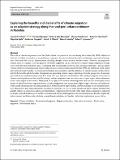Exploring the benefits and dis-benefits of climate migration as an adaptive strategy along the rural-peri-urban continuum in Namibia
Abstract
The scale of climate migration across the Global South is expected to increase during this century. By 2050, millions of Africans are likely to consider, or be pushed into, migration because of climate hazards contributing to agricultural disruption, water and food scarcity, desertification, flooding, drought, coastal erosion, and heat waves. However, the migration-climate nexus is complex, as is the question of whether migration can be considered a climate change adaptation strategy across both the rural and urban space. Combining data from household surveys, key informant interviews, and secondary sources related to regional disaster, demographic, resource, and economic trends between 1990 and 2020 from north central and central dryland Namibia, we investigate (i) human migration flows and the influence of climate hazards on these flows and (ii) the benefits and dis-benefits of migration in supporting climate change adaptation, from the perspective of migrants (personal factors and intervening obstacles), areas of origin, and areas of destination. Our analysis suggests an increase in climate-related push factors that could be driving rural out-migration from the north central region to peri-urban settlements in the central region of the country. While push factors play a role in rural-urban migration, there are also several pull factors (many of which have been long-term drivers of urban migration) such as perceived higher wages, diversity of livelihoods, water, health and energy provisioning, remittances, better education opportunities, and the exchange of non-marketed products. Migration to peri-urban settlements can reduce some risks (e.g. loss of crops and income due to climate extremes) but amplify others (e.g. heat stress and insecure land tenure). Adaptation at both ends of the rural–urban continuum is supported by deeply embedded linkages in a model of circular rural–urban-rural migration and interdependencies. Results empirically inform current and future policy debates around climate mobilities in Namibia, with wider implications across Africa.
Citation
Thorn , J P R , Nangolo , P , Biancardi , R A , Shackleton , S , Marchant , R A , Ajala , O , Delgado , G , Mfune , J K E , Cinderby , S & Hejnowicz , A P 2022 , ' Exploring the benefits and dis-benefits of climate migration as an adaptive strategy along the rural-peri-urban continuum in Namibia ' , Regional Environmental Change , vol. 23 , no. 1 , 10 . https://doi.org/10.1007/s10113-022-01973-5
Publication
Regional Environmental Change
Status
Peer reviewed
ISSN
1436-378XType
Journal article
Description
Funding: This research is funded by a UK Research and Innovation’s Global Challenges Research Fund University of York internal pumping grant Peri-Urban Resilient Ecosystems, the African Research and Initiative for Scientific Excellence (ARISE-PP-FA-141), the Development Corridors Partnership project (ES/P011500/1), the African Women in Climate Change Science Fellowship supported by the African Institute of Mathematical Sciences and Canadian International Development Research Centre, and the Climate Research for Development Postdoctoral Fellowship (CR4D-19–21) implemented by the African Academy of Sciences in partnership with the UK’s Department for International Development, Weather and Climate Information Services for Africa (WISER) programme and the African Climate Policy Center of the United Nations Economic Commission for Africa.Collections
Items in the St Andrews Research Repository are protected by copyright, with all rights reserved, unless otherwise indicated.

